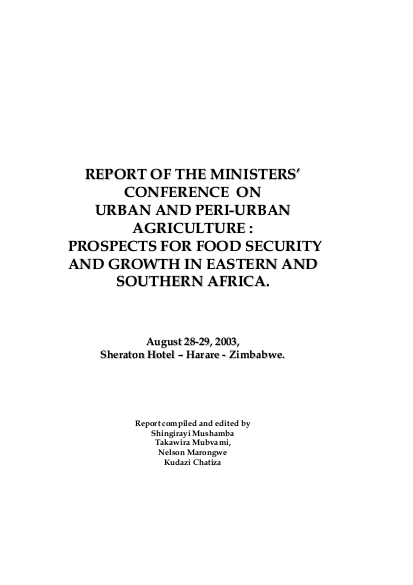
Urban agriculture is one of the main activities urban residents are undertaking in an effort to among other things a) ensure food security b) alleviate poverty and c) reduce environmental degradation in their areas. Urban agriculture contributes greatly to the food security of many urban residents in Eastern and Southern Africa. City case studies in the region by researchers such as Mlozi 1992; Drescher, 1996; Mbiba, 1995; Mudimu, 1996 show a considerable degree of self-sufficiency in cereal, fresh vegetable and small livestock production. It was estimated that the number of people obtaining part of their food from urban agriculture in six East and Southern African countries will rise from about 25 million to 40 million by 2020. It is estimated that globally urban agriculture now produces fifteen percent of all food consumed in urban areas, and that this percentage is likely to double within twenty years, [UNCHS (Habitat), 2001]. Self-produced food in the urban areas provides nutritious food otherwise unaffordable, replaces purchased staples or supplements these with more nutritious foodstuff, affords savings which can be spent on non-produced foodstuff or other needs and generates principal income which can be reinvested in other urban businesses. Urban agriculture also provides employment to a large number of urban residents. In Nairobi, for example, 25% of the population is employed in urban agricultural activities. In addition, urban agriculture is one of the several tools for making productive use of urban open spaces, treating and or recovering urban waste and managing freshwater resources more effectively. The relation between urban agriculture and waste management is most pronounced in the use of organic wastes. Urban agriculture can indirectly improve urban water management because green spaces with permeable land surfaces allow rainwater and runoff to drain through the soil. Intensive high value urban and urban agriculture has great potential in addressing poverty through the creation of employment, improving nutrition for HIV/AIDS sufferers and food security if given support. However, urban and peri-urban agriculture has not gained enough support from governments in the Eastern and Southern Africa region. Policy makers and senior managers need to be made aware of the issues that need to be addressed to promote urban and peri-urban agriculture.
Resource collections
- Evaluating humanitarian action
- UN Habitat - Urban Response Collection
- Urban Response - Urban Crisis Preparedness and Risk Reduction
- Urban Response Collection - Community Engagement and Social Cohesion
- Urban Response Collection - Economic Recovery
- Urban Response Collection - Environment and Climate Change
- Urban Response Collection - Housing, Land and Property
- Urban Response Collection - Urban Crisis Response, Recovery and Reconstruction
- Urban Response Collection - Urban Resilience